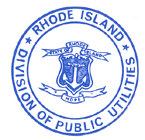A Basic Overview Of Utility Regulation In Rhode Island

A “public utility” is commonly defined as an organization that provides a service to the general public – electricity, natural gas, water, wastewater treatment, telephone, and transportation – and that maintains the necessary infrastructure to provide the service. Public utilities can be privately or publicly owned. Publicly owned utilities include municipal utilities that are operated as non-profit ventures. Privately owned utilities, also called investor-owned utilities, operate for profit, often referred to as a rate of return.
Public utilities are often natural monopolies without any competition because the infrastructure required to produce and deliver a product such as electricity or water is very expensive to build and maintain. As a result, many utilities are regulated by government agencies such as public utilities commissions. Such commissions are typically composed of appointed commissioners and dedicated staff that approve or deny rate increases, monitor relevant activities, and implement and enforce rules and regulations governing the utilities.
In Rhode Island, many, but not all, public utilities are regulated by two public bodies – The Rhode Island Public Utilities Commission (“PUC”) and The Rhode Island Division of Public Utilities and Carriers (“Division”):
The Rhode Island Public Utilities Commission – The PUC serves as a quasi-judicial tribunal with jurisdiction, powers, and duties to implement and enforce standards of conduct and to hold investigations and hearings involving rates, tariffs, tolls, charges, and the sufficiency and reasonableness of facilities to provide gas, electric, water, wastewater treatment, telephone, and ferry boat service. Through participation in the Energy Facility Siting Board, the PUC also exercises jurisdiction over the siting of major energy facilities. Finally, the PUC regulates many aspects of renewable energy development and implementation under the Rhode Island Renewable Energy Act.
The Rhode Island Division of Public Utilities and Carriers – The Division, which is headed by an Administrator who is not a PUC Commissioner, exercises the jurisdiction, supervision, powers and duties not specifically assigned to the PUC. The Division holds exclusive jurisdiction over the rates, tariffs, tolls, charges and sufficiency and reasonableness of facilities for motor carriers of property and passengers over the state’s public roadways, including taxi companies, moving companies and limousine services. The Division also supervises and regulates Community Antenna Television Systems (CATV) in Rhode Island; enforces Rhode Island’s DigSafe laws; and, regulates all public utility debt issuances.
The regulation of public utilities in Rhode Island, and the origins of these two regulatory agencies, dates back to 1839 when the Rhode Island Commission was established. In 1981 the General Assembly created the quasi-judicial PUC that exists today and combined it with the Division into a unified regulatory agency. Between 1981 and 1996 the roles of the Division’s Administrator and the PUC’s Chairperson were combined in a single position. The Utility Restructuring Act of 1996 divided these roles into the two separate positions that exist today.
Some of the utilities regulated by the PUC and Division are as follows:
Electric
National Grid
Pascoag Utility District
Block Island Power Company
Natural Gas
National Grid
Water
Providence Water Supply Board
Pawtucket Water Supply Board
Kent County Water Authority
City of Newport Water Department
Suez Water Rhode Island
City of Woonsocket Water Department
Wastewater
Narragansett Bay Commission
Practicing before the PUC and Division requires particularized knowledge by legal counsel. Any attorney representing a regulated utility before the PUC and Division must understand the regulatory process, which includes knowledge of both the PUC’s and Division’s Rules of Practice and Procedure as well as the applicable statutory and case law. Keough + Sweeney represents and counsels water, wastewater and renewable energy clients in all aspects of the regulatory process before the PUC and Division. So please feel free to call us or visit Keough + Sweeney for questions regarding utility regulation in Rhode Island.


